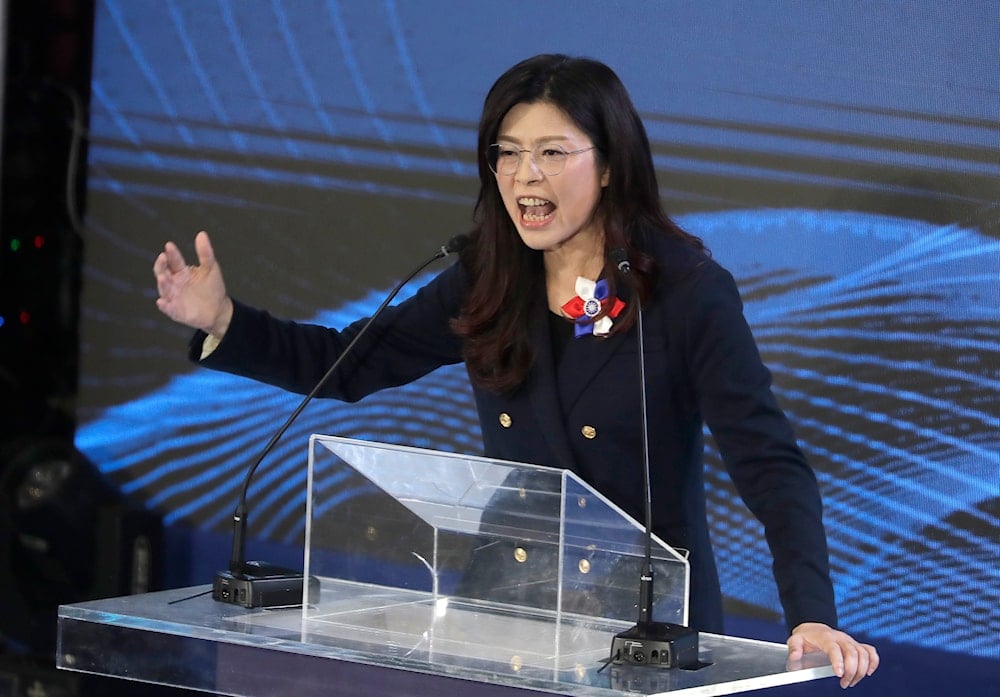Taiwan’s new opposition leader against defense budget hike, arms race
Taiwan’s new opposition leader Cheng Li-wun opposes President Lai’s plan to raise defense spending beyond 3% of GDP, urging dialogue with Beijing.
-

Cheng Li-wun, newly elected chairperson of Taiwan's main opposition party, Kuomintang (KMT), delivers a speech during a party congress in Taipei, Taiwan, on November 1, 2025 (AP)
Taiwan’s newly elected opposition leader, Cheng Li-wun, has rejected President Lai Ching-te’s plans to raise the island’s defense spending beyond 3% of GDP, warning against a “pointless arms race" and that the proposal would strain the government’s finances and escalate tensions with China.
Cheng Li-wun, who officially assumes leadership of the Kuomintang (KMT) on Saturday, told AFP that Taiwan cannot afford to meet Washington’s demands for higher military spending.
“Taiwan isn't an ATM, we really don't have that much money,” she said.
“We certainly have the determination to defend Taiwan, but it’s not a blank cheque,” the opposition leader added.
Cheng reiterated her calls for a “reasonable defense budget.”
US pushes Taiwan to spend 5% of GDP
Lai, from the ruling Democratic Progressive Party (DPP), has proposed NT$949.5 billion (around US$31 billion) for next year’s defense budget, equivalent to 3.32% of GDP, alongside a special fund of up to NT$1 trillion to upgrade air defenses and expand ammunition production.
The plan, strongly encouraged by Washington, aims to increase military spending to 5% of GDP by 2030.
KMT, allies hold the purse strings
However, the KMT, which controls Taiwan’s parliament with support from the smaller Taiwan People’s Party, has already signaled resistance. The opposition bloc recently cut the 2025 general budget and froze parts of the defense allocation.
Cheng asserted that a “vast majority” within her party supports her stance against excessive military spending, though her predecessor, Eric Chu, had previously backed an increase above 3% of GDP, but without purchasing more US weapons.
The United States remains Taiwan’s largest arms supplier, despite severing formal diplomatic ties with Taipei in 1979 to recognize Beijing.
Read more: Trump nominee backs Taiwan defense boost to 10% of GDP to face China
Dialogue, not militarization
Cheng accused President Lai of steering Taiwan toward a dangerous confrontation with the People's Republic of China (PRC).
“If cross-strait relations are peaceful and stable, we don’t need a pointless arms race,” Cheng said, arguing that renewed dialogue with Beijing was the best path to peace.
China cut high-level communications with Taiwan in 2016, after former president Tsai Ing-wen, also from the DPP, took office. Cheng, who began her political career in the DPP before joining the KMT in 2005, said she was open to meeting with Chinese President Xi Jinping, adding that maintaining the “status quo” between Taipei and Beijing was unsustainable.
“What we are working hard for now is to prevent it from escalating into war, but rather towards reconciliation and peace,” she said.
After three consecutive presidential defeats, Cheng acknowledged that the KMT “cannot afford to lose again” in 2028. Chinese President Xi had congratulated Cheng for being elected chairperson of the Kuomintang earlier on October 18. He also expressed his expectations for the KMT and the Communist Party of China (CPC) to strengthen their common political foundation and unite the vast majority of people in Taiwan and advance national reunification.
Read more: Chinese Defense Minister reaffirms stance on Taiwan at Xiangshan Forum
A look into One China Policy
China-Taiwan relations cannot be addressed without considering the One China Policy, which recognizes that there is only one China, encompassing both mainland China and Taiwan. Countries, such as the United States, that formally recognize the People’s Republic of China (PRC) do not maintain official diplomatic relations with Taiwan (Republic of China, ROC).
After the Chinese Civil War, which lasted from 1945 to 1949, the PRC was established on the mainland, while the KMT-led ROC government retreated to Taiwan. Most countries, including the US, recognize the PRC as the sole government of China.
The United States has traditionally adhered to the One China Policy, recognizing the PRC as the sole legal government of China and limiting official ties with Taiwan.
However, recent developments have raised questions about Washington’s commitment. In 2025, the State Department removed longstanding language asserting it does not support Taiwan independence, while Congress debated resolutions advocating closer ties with Taipei. The US has also conducted military exercises and approved arms sales with Taiwan, prompting Beijing to warn that such actions contravene the policy.
Read more: Taipei turns to MAGA influencers ahead of Trump-Xi talks

 4 Min Read
4 Min Read










